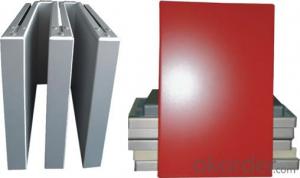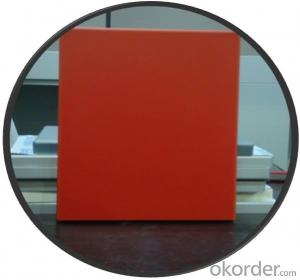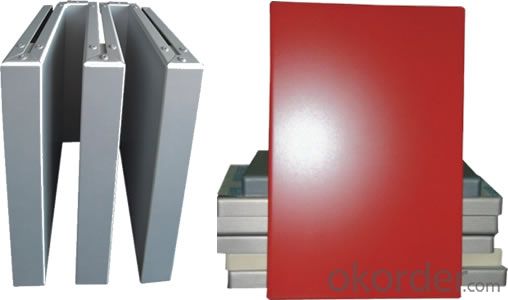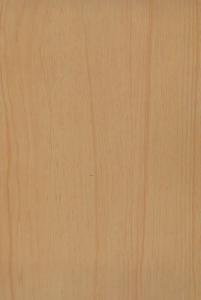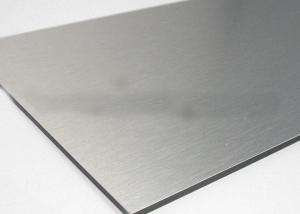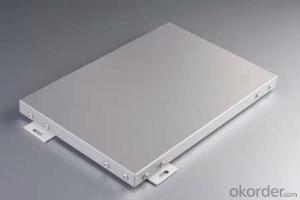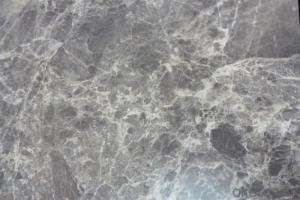Wood Grain Coated Square Aluminum Panel
- Loading Port:
- China Main Port
- Payment Terms:
- TT OR LC
- Min Order Qty:
- -
- Supply Capability:
- -
OKorder Service Pledge
Quality Product, Order Online Tracking, Timely Delivery
OKorder Financial Service
Credit Rating, Credit Services, Credit Purchasing
You Might Also Like
Coated Square Aluminium Panel
Specifications:
Alloy:1xxx,3xxx,8xxx series
Temper: O,F,H111,H112,H12,H14,H16,H18,H22,H24,H26 etc.
Thickness: 0.2mm-150mm
Width: 500mm-2800mm
Length: 500mm-10000mm
Tensile Strength: 110 to 170 MPa
Elongation: >=2%
Standard dimensions: 1219x2438mm, 48''x96''
ISO9001, SGS passed
Competitive price
Professional producing & exporting experience
All kinds of Alloy and size are available
Coated Square Aluminium Panel
Specifications:
Alloy:1xxx,3xxx,8xxx series
Temper: O,F,H111,H112,H12,H14,H16,H18,H22,H24,H26 etc.
Thickness: 0.2mm-150mm
Width: 500mm-2800mm
Length: 500mm-10000mm
Tensile Strength: 110 to 170 MPa
Elongation: >=2%
Standard dimensions: 1219x2438mm, 48''x96''
ISO9001, SGS passed
Competitive price
Professional producing & exporting experience
All kinds of Alloy and size are available
- Q: What happens when you mix Aluminum (or magnesium) with calcium carbonate? Can you write a chemical equation please?
- 2Al + 3CaCO3 = Al2(CO3)3 + 3Ca
- Q: Cost of aluminium coil coating fluorocarbon paint?
- Hello, fluorocarbon paint according to the use of distinction: external wall fluorocarbon paint, aluminum, fluorocarbon paint, metal fluorocarbon paint, steel, fluorocarbon paint. According to industry standards to distinguish: GB products, non GB products.
- Q: What are the different coil handling options available for aluminum coils?
- Aluminum coils have several options for handling, depending on the user's preferences and specific requirements. Some commonly used options include: 1. Coil Cradles: These are horizontal racks or frames that provide support and stability for aluminum coils during storage or transportation. They come in various sizes and designs to accommodate different coil dimensions. 2. Coil Cars: These mobile platforms have lifting mechanisms to easily move aluminum coils between different processing stations. They can be manually operated or automated, depending on the desired level of automation. 3. Coil Turnstiles: These rotating devices hold multiple coils vertically, allowing for easy access to individual coils without heavy lifting or rearranging. They are ideal for high-volume production environments that require quick coil changeovers. 4. Coil Upenders: Specialized equipment used to rotate or flip aluminum coils to change their orientation. They are useful for loading or unloading coils in a vertical position or for specific processes that require a particular coil orientation. 5. Coil Lifters: Specifically designed lifting devices for aluminum coils. They have adjustable arms or clamps to securely grip the coil for safe and efficient lifting. Available in manual, semi-automatic, and fully automated models. 6. Coil Tippers: Used to tilt or incline aluminum coils for various purposes such as coil feeding or inspection. They can be operated manually or powered by hydraulic or pneumatic systems. 7. Coil Stackers: Used to neatly stack and store aluminum coils vertically. They have adjustable arms or forks to accommodate different coil sizes, optimizing storage space and ensuring easy access when needed. These examples showcase the variety of coil handling options available for aluminum coils. Each option has its own advantages and suitability for different applications or industries. Careful consideration of specific requirements and constraints is essential when selecting the most appropriate coil handling solution.
- Q: Can aluminum coils be used in aerospace heat exchangers?
- Aerospace heat exchangers can indeed utilize aluminum coils. In the aerospace industry, aluminum is widely employed due to its lightweight nature and exceptional thermal conductivity. Heat exchangers play a critical role in aerospace systems by transferring heat between different mediums. Aluminum coils effectively conduct heat, making them suitable for aerospace heat exchangers. Moreover, aluminum's resistance to corrosion is essential in the challenging environments encountered in aerospace applications. Additionally, its low density contributes to fuel efficiency by reducing the overall weight of aircraft. Hence, aerospace heat exchangers prefer aluminum coils owing to their outstanding thermal conductivity, lightweight properties, and corrosion resistance.
- Q: how many chloride ions are present? how many chlorine ions are present? what is the mass in grams of one formula unit of aluminum chloride?
- Aluminum Chloride is simply AlCl3 So In each mole of AlCl3 there are 1 mol of Al 3 mol of Cl We know (from periodic table), 1 mol of Al weighs 26.98 g 1 mol of Cl weighs 35.47g so 1 mol of AlCl3 weighs 26.98g + 3x35.47g = 133.39 g sooo moles of AlCl3 = 37.2 g /133.39 g/mol = 0.279 mol in one mol of anything, there are 6.02 x 10 ^ 23 of that thing... so we have 0.279 mol x 6.02 x 10 ^ 23 molecules /mole = 1.68 x 10 ^ 23 And, we know one molecule of AlCl3 dissociates into one Al ion and 3 Cl ions sooo 1.68 x 10 ^ 23 AlCl3 ions dissociate into 1.68 x 10 ^ 23 Al ions so answer is 1.68 x 10 ^ 23 Al ions
- Q: Can aluminum coils be customized according to specific requirements?
- Yes, aluminum coils can be customized according to specific requirements. Manufacturers can adjust the size, thickness, and shape of the coils to meet the specific needs of customers. They can also apply various coatings or finishes to enhance the performance or appearance of the coils.
- Q: Are aluminum coils suitable for heat exchanger applications?
- Yes, aluminum coils are suitable for heat exchanger applications. Aluminum is a lightweight and highly conductive material, making it an excellent choice for heat transfer applications. Aluminum coils offer several advantages in heat exchangers, such as high thermal conductivity, corrosion resistance, and ease of fabrication. They are commonly used in various heat exchanger systems, including air conditioning, refrigeration, and automotive applications. Additionally, aluminum coils can be easily formed into different shapes and sizes, allowing for greater design flexibility. Overall, aluminum coils are a reliable and efficient option for heat exchanger applications.
- Q: Can aluminum coils be used for solar panel installations?
- Yes, aluminum coils can be used for solar panel installations. Aluminum is a commonly used material in the construction of solar panels due to its lightweight, durability, and corrosion resistance properties. It is often used for framing and mounting systems to support and protect the solar panels.
- Q: i am thnking of building my own aluminum john boat and using the propulsion from a jetski to power it, i was wondering if anyone had taken on a project like this and had a few pieces of advice to offer while i am still in the planning stages. the biggest concern i have right now involves the tunnel for the intake, should i use the original fiberglass from the jetski or build up a tunnel out of aluminum for it?
- I have built from both aluminum and steel. It sounds interesting and I would suggest using the fiberglass set up as all the clearances are set so you could just bond it to the aluminum. You can bond a fiberglass structure to aluminum by both bolting it up and bedding it down with something like 3M 5200.
- Q: Are aluminum coils suitable for insulation purposes?
- Yes, aluminum coils are suitable for insulation purposes. Aluminum is a highly effective conductor of heat and electricity, making it an ideal choice for insulation. Aluminum coils can be used in various applications such as HVAC systems, refrigeration units, and electrical wiring. The coils are typically coated with a layer of insulation material such as polyurethane foam or fiberglass to enhance their insulating properties. The combination of aluminum and insulation helps to prevent the transfer of heat or cold, providing excellent thermal insulation. Additionally, aluminum is lightweight, durable, and resistant to corrosion, making it a reliable choice for long-term insulation needs.
Send your message to us
Wood Grain Coated Square Aluminum Panel
- Loading Port:
- China Main Port
- Payment Terms:
- TT OR LC
- Min Order Qty:
- -
- Supply Capability:
- -
OKorder Service Pledge
Quality Product, Order Online Tracking, Timely Delivery
OKorder Financial Service
Credit Rating, Credit Services, Credit Purchasing
Similar products
Hot products
Hot Searches
Related keywords
